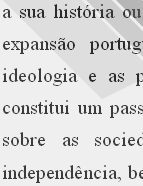

................................
Given the delayed end of Portuguese colonialism, the strong ideologization of the colonial issue in the face of the international community's rejection and the urgency of the Portuguese expansion and its identification as the pillar of the nation, it is possible to understand the difficulties in organising a scientific and historiographical discourse free of colonial ideology, which remained deaf to the recovery of the autonomous voice of the Other, rejecting their history or dissolving it in the history of the Portuguese discoveries and expansion. Dismantling the articulation between ideology and the scientific productions of a long colonial rule is an important step towards a renewal of knowledge regarding the colonised societies rebuilt with independence, as well as an indispensable condition to ensure a change in the writing of Portuguese history.
Colonial ideology and knowledge
Colonial ideology and domination
In the mid-twentieth century, while Europe negotiated African and Asian independences, Portugal reinforced the obstinate character of its colonialism, supported by an ideological construction that ensured national cohesion, guaranteed the colonists' tranquillity and guided the production of knowledge. While at the domestic level, political leaders resorted to the diffuse racism that characterised the relations of the Portuguese with the colonised countries, at the international level, they mobilised the 'historical rights' and singularity of their colonialism to reject the changes of history. Organised around three groups of myths which, although in tune with European colonial ideologies, presented autonomous formulations, the Portuguese colonial ideological system acquired a unique theoretical density, the strength of which can be measured by its duration and capacity to resist the disappearance of colonial domination itself. These three groups of myths, conceived in three dimensions - anthropological (the racial and cultural superiority of the white man and his corollary "civilising mission"), historical (the founding role of the Portuguese discoveries in knowledge and the secular continuity of Portugal's presence in the world) and sociological (Gilberto Freyre's Lusotropicalism, proving the harmonious relations always established by the Portuguese with other peoples, the virtues of "assimilation" and evidence of the absence of national racism), firmly established the scientific and historical legitimacy of the Portuguese colonial options.
